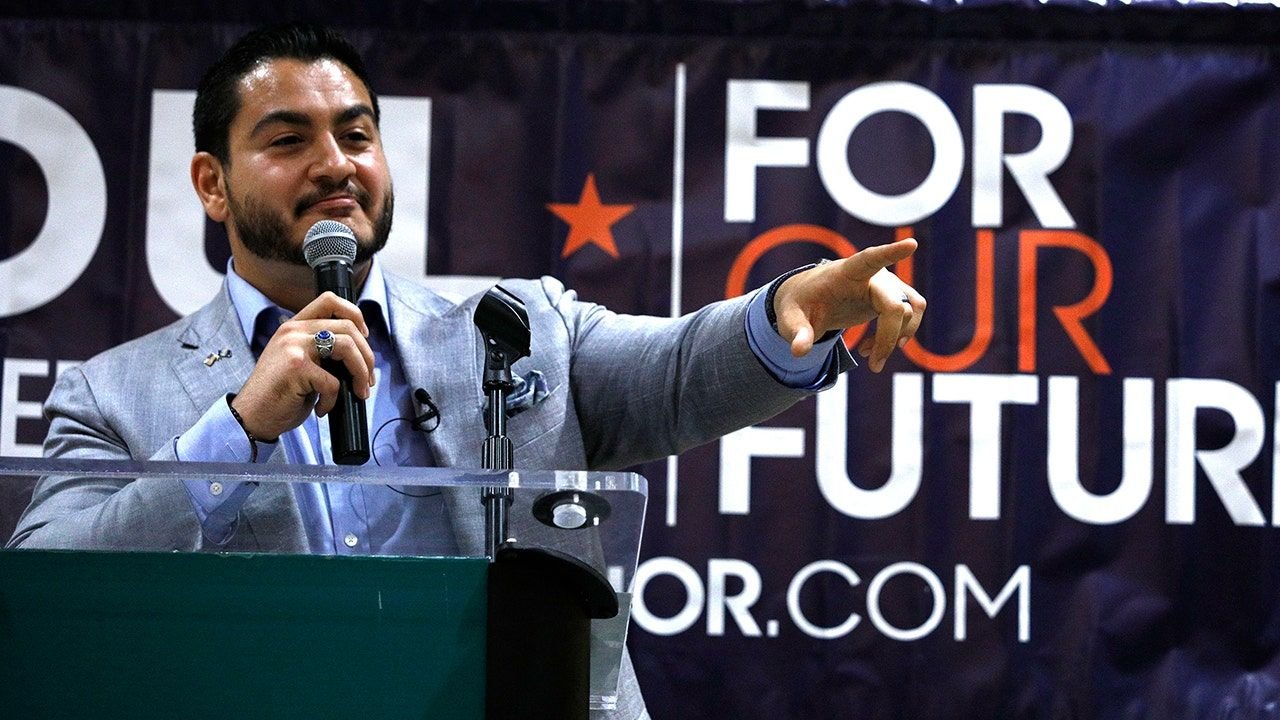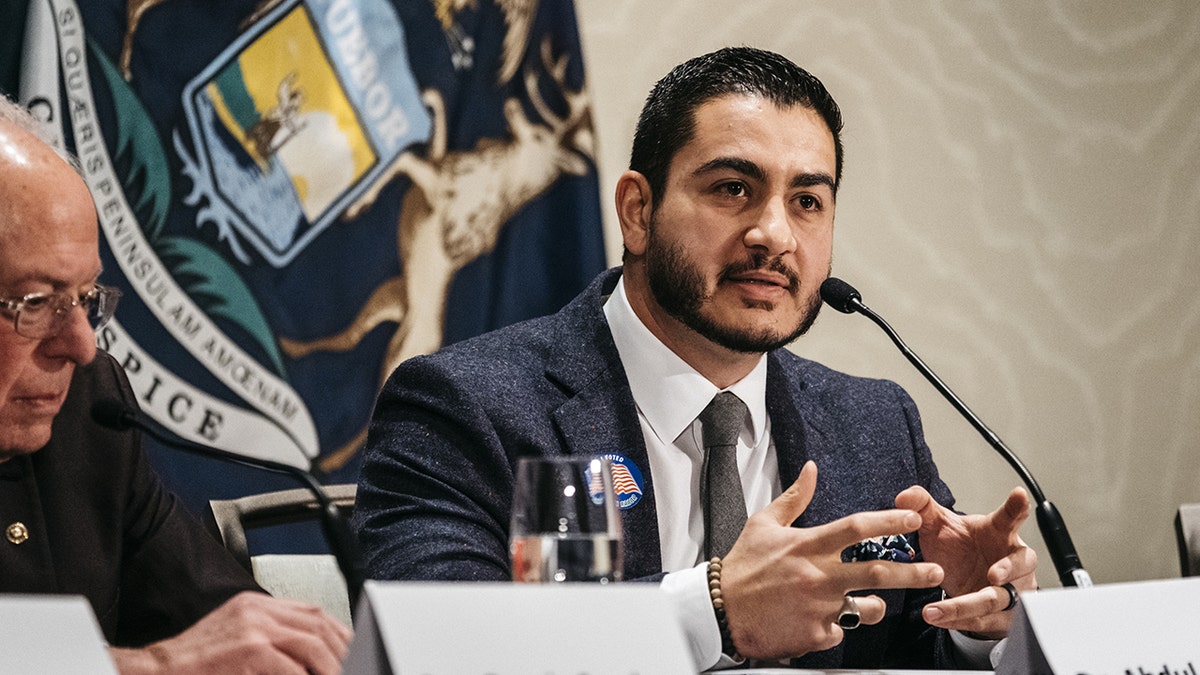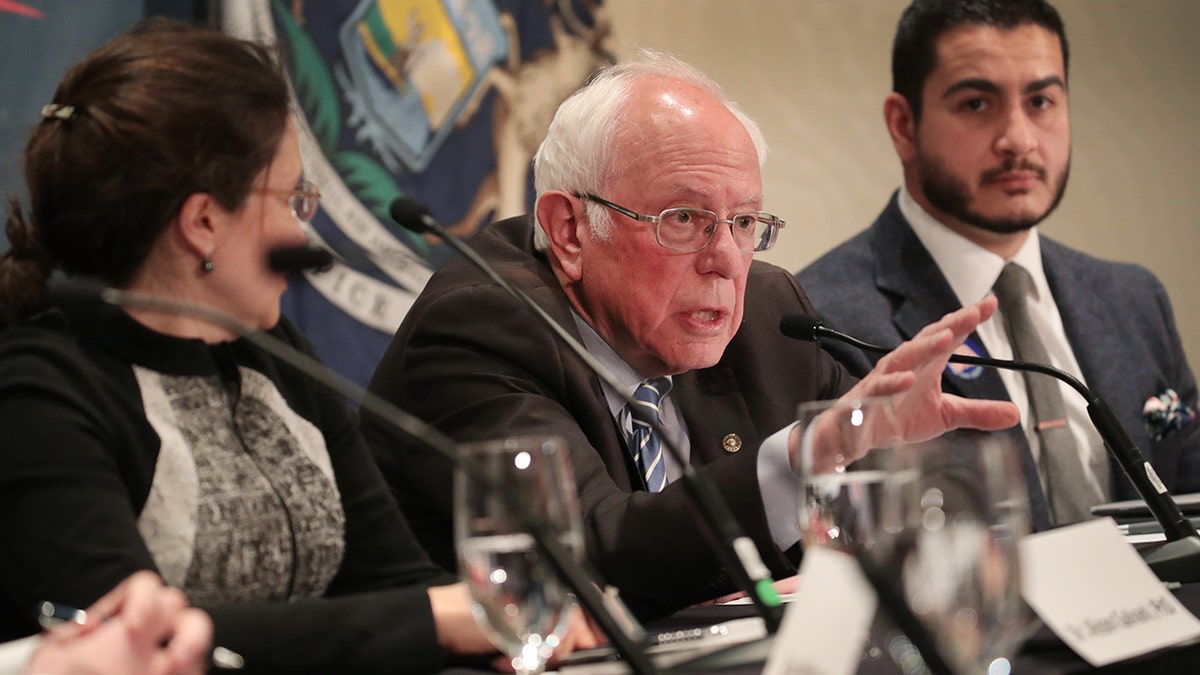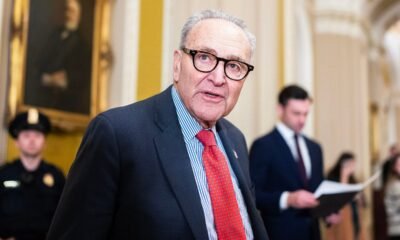INTERNACIONAL
Fierce Israel critic launches Senate bid in Michigan high-stakes 2026 midterm race

A former Michigan public health official and Democratic candidate for governor entered the race for the state’s open U.S. Senate seat on Thursday in what could be one of the most watched races in the 2026 midterm elections.
Abdul El-Sayed, 40, is the second Democrat to put his name in the running to replace Democratic Sen. Gary Peters, who is not seeking reelection.
El-Sayed, a prominent figure in a movement that was highly critical of support for Israel in the 2024 election cycle, aims to set himself apart from the other Democratic candidates in the race to replace Peters, state Sen. Mallory McMorrow.
McMorrow has said she would vote against Senate Majority Leader Chuck Schumer, D-N.Y., retaining his leadership position should she prevail in the primary and general election to represent the battleground state in the upper chamber of Congress.
However, El-Sayed held back criticism of Schumer.
«Anybody who tells you that they’re going to unilaterally oppose one potential candidate without knowing who the alternative is, is either unnuanced or unsophisticated,» El-Sayed told Politico. «So I want to know who is available, who is actively seeking the leadership. I’ll make a decision from there.»
GRETCHEN WHITMER RIBBED ONLINE FOR SEEMING TO HIDE FACE IN OVAL OFFICE
Michigan Democratic then-gubernatorial candidate Abdul El-Sayed campaigns with support from New York Democrat Alexandria Ocasio-Cortez at a rally on the campus of Wayne State University on July 28, 2018, in Detroit. (Bill Pugliano/Getty Images)
«What we need right now is somebody who’s willing to take the fight directly to Trump and Musk, but then also knows how to rebuild a version of our federal government that better serves working people after the carnage that Musk and Trump are going to leave behind, and I think I offer that,» he told Politico.
Other Democrats considering a run to replace Peters include U.S. Rep. Haley Stevens and Michigan Attorney General Dana Nessel.
El-Sayed was active in the «uncommited movement,» a group of anti-Israel, traditionally Democratic voters in Michigan, a critical swing state, who threatened to withhold support from then-President Joe Biden, and then then-Vice President Kamala Harris, over the administration’s stance on Gaza. He did say he would back whoever was the eventual Democratic choice for the presidential ticket to oppose now-President Donald Trump, according to Politico.
The Israel-Hamas war exposed deep divisions within the Democratic Party last election cycle, and there is concern the conflict could again make for a messy Senate Democratic primary in Michigan if the American Israel Public Affairs Committee intervenes. The powerful pro-Israel lobby group financially backed Stevens in 2022, when redistricting forced a competitive primary run against fellow Democrat, Rep. Andy Levin.
«Everybody is unified around leadership that reminds the Democratic Party that we ought to be the party of peace and justice, that we ought not to be the party sending bombs and money to foreign militaries to drop bombs on other people’s kids in their schools and their hospitals, when our kids need more, our hospitals and schools need more, and we should be spending that money here at home,» El-Sayed told Politico.

Abdul El-Sayed speaks during a coronavirus public health roundtable with presidential candidate Sen. Bernie Sanders on Monday, March 9, 2020. (Erin Kirkland/Bloomberg via Getty Images)
FIRST ON FOX: REPUBLICAN LAUNCHES SECOND STRAIGHT BID TO FLIP DEMOCRAT-HELD SENATE SEAT IN KEY BATTLEGROUND
El-Sayed ran for governor in 2018 as a progressive Democrat and was endorsed by Sen. Bernie Sanders, I-Vt., and Rep. Alexandria Ocasio-Cortez, D-N.Y.
He came in second in the Democratic primary, losing to Gretchen Whitmer by more than 20 points and beating now-U.S. Rep. Shri Thanedar by more than 12 points. Whitmer went on to win the general election and is in the midst of a second term. She cannot run again because of term limits.
A resident of Ann Arbor, El-Sayed recently served as director of the Department of Health, Human and Veterans Services in Wayne County, home to Detroit. Before that, he was the public health director of the city after it declared bankruptcy in 2013.
El-Sayed cautioned Democrats against learning the «wrong lessons» from their defeats.

Democratic presidential candidate Sen. Bernie Sanders participates in a coronavirus public health roundtable with healthcare professionals, including Abdul El-Sayed, left, as he campaigns on March 9, 2020, in Detroit. (Scott Olson/Getty Images)
«If you cut corners and trim your message, and you triangulate to the least common denominator, you can find something that’s perfectly inoffensive to everyone, and the problem with that is that you’re not actually saying anything,» he told Politico.
El-Sayed said he met with the Democratic Senatorial Campaign Committee on Tuesday. He told Politico that it was his «understanding» that the Senate Democrats’ campaign arm would not get involved in the primary. If that happens, that deviates from how the DSCC previously acted to clear the field of potential primary candidates to make for an easier primary victory for then-Rep. Elissa Slotkin. Now-Sen. Slotkin, D-Mich., easily won the primary over Hill Harper, and then won the general election.
CLICK HERE TO GET THE FOX NEWS APP
El-Sayed is also the second candidate this week to launch a campaign to replace Peters. On the Republican side, former U.S. Rep. Mike Rogers launched his bid on Monday after losing the Senate race last year by 19,000 votes to Democrat Slotkin.
The Associated Press contributed to this report.
Michigan,Senate,Senate Democrats,Bernie Sanders,Alexandria Ocasio-Cortez
INTERNACIONAL
Las acciones que más ganaron y las que tuvieron peores resultados en Wall Street en 2025

El índice S&P 500 cerrará 2025 con un avance superior al 17%, consolidando un ciclo alcista de tres años impulsado por el entusiasmo en torno a la inteligencia artificial. Este año, la tendencia ligada al sector se amplió. Las acciones de empresas de semiconductores volvieron a liderar el índice, acompañadas por compañías vinculadas a la construcción de centros de datos, fundamentales para el desarrollo tecnológico. Entre los diez valores con mejor desempeño en 2025, tres corresponden a firmas de almacenamiento de datos, beneficiadas por el compromiso de los principales proveedores de servicios en la nube, conocidos como hyperscalers, que han anunciado inversiones por más de 440.000 millones de dólares en los próximos doce meses para fortalecer sus capacidades en inteligencia artificial.
El liderazgo tecnológico experimentó un giro, según el balance anual: las compañías asociadas a la gestión y construcción de infraestructura de datos protagonizaron el crecimiento. Gigantes como Microsoft Corp., Amazon.com Inc., Alphabet Inc. y Meta Platforms Inc. figuran entre los principales impulsores de estas inversiones. Empresas como Sandisk Corp., Western Digital Corp. y Seagate Technology Holdings Plc se ubicaron entre las cuatro acciones más rentables del S&P 500.
La composición del índice también registró novedades relevantes. En 2025, se sumaron firmas como Robinhood Markets Inc., Sandisk, AppLovin Corp. y Carvana Co., todas con revalorizaciones de tres dígitos, situándose entre los veinte mejores rendimientos del año. No todas las incorporaciones resultaron exitosas: Trade Desk Inc. fue la de peor desempeño, con una caída cercana al 70%, mientras que Block Inc. retrocedió más del 20% y Coinbase Global Inc. perdió más del 6%.
El entusiasmo por la inteligencia artificial también favoreció a Palantir Technologies Inc., que registró un alza porcentual de tres dígitos por tercer año consecutivo, impulsada por el interés de inversores minoristas y la gestión de su consejero delegado, Alex Karp. Actualmente, la acción cotiza a más de 180 veces sus beneficios futuros, ubicándose como la tercera más cara del índice, solo detrás de Tesla Inc. y Warner Bros. Discovery Inc.
La escalada de Warner Bros. Discovery Inc. rozó el 175% a raíz de especulaciones sobre una potencial venta. En octubre, la compañía inició un proceso formal de venta, con Paramount Skydance Corp. y Netflix Inc. como principales interesados. El consejo de administración de Warner Bros. manifestó su preferencia por la oferta de Netflix, mientras que Larry Ellison, presidente de Oracle Corp. y padre del consejero delegado de Paramount, respalda personalmente la propuesta rival.
En contraste, la incertidumbre económica y la política comercial de la administración del presidente estadounidense Donald Trump, caracterizada por la imposición de aranceles, afectó negativamente a compañías de consumo y al sector sanitario. Acciones de firmas como Clorox Co., Lamb Weston Holdings Inc., Campbell’s Co. y Constellation Brands Inc. se posicionaron entre las veinte con peores resultados del año. Chipotle Mexican Grill Inc. sufrió una caída cercana al 40% tras dos años de avances consecutivos.
El entorno adverso también perjudicó a empresas minoristas. Deckers Outdoor Corp., propietaria de las marcas Hoka y Ugg, perdió casi la mitad de su valor, interrumpiendo una racha alcista de nueve años debido a previsiones de resultados débiles y recortes en las recomendaciones de analistas. Lululemon Athletica Inc. encadenó su segundo descenso anual de doble dígito, con una caída próxima al 45%, en medio de un proceso de reestructuración tras la salida de su consejero delegado y la entrada del fondo activista Elliott Investment Management, que adquirió una participación superior a 1.000 millones de dólares.

El sector de seguros de salud tampoco logró recuperarse a pesar de las expectativas de un cambio regulatorio. Molina Healthcare Inc. retrocedió más del 40% por segundo año consecutivo. UnitedHealth Group Inc. y Centene Corp. perdieron más del 30%, situándose entre los veinticinco peores valores del S&P 500. Algunos inversores, como el gestor Michael Burry, consideran que las valoraciones actuales podrían anticipar una recuperación y ven potencial en adquisiciones para 2026 si los precios se mantienen bajos.
(Con información de Bloomberg)
Europe,ZENICA
INTERNACIONAL
Here’s where Trump launched airstrikes around the world in 2025: ‘Protect the homeland’

NEWYou can now listen to Fox News articles!
Though touting himself as the peace president, President Donald Trump has also not been afraid to unleash lethal rocket strikes on U.S. enemies when he feels the need arises.
In 2025, Trump ordered strikes on nine different countries and regions in the interest of furthering U.S. national security.
Here are the countries, groups and regions that felt the power of the U.S. military in action this year.
Somalia terrorists targeted
Throughout the year, the U.S. has continued to conduct airstrikes against ISIS factions and al-Shabaab in Somalia.
According to a U.S. Africa Command statement, a Feb. 1 airstrike targeting a series of cave complexes in northern Somalia killed 14 ISIS-Somalia operatives, including Ahmed Maeleninine, a key ISIS recruiter, financier, and external operations leader responsible for deploying militants into the U.S. and across Europe.
RUBIO IDENTIFIES ‘SINGLE MOST SERIOUS THREAT’ TO THE US FROM WESTERN HEMISPHERE
President Donald Trump has targeted Venezuelan drug boats with military strikes. (@realDonaldTrump via Truth Social/AP Photo/Alex Brandon)
Houthis in Yemen
Thousands of miles from U.S. sovereign territory, the Trump Department of War unleashed lethal strikes on Iran-backed Houthi terror fighters in Yemen as part of a mission dubbed «Operation Rough Rider.» The strikes were in response to attacks against U.S. military and commercial vessels traveling through the Red Sea.
Sean Parnell, a spokesperson for the Department of War, said in May that U.S. Central Command strikes had been carried out since March and that they had «hit over 1,000 targets, killing Houthi fighters and leaders and degrading their capabilities.»
Parnell called the strikes «hugely successful.» On May 6, the Houthis agreed to a ceasefire with the U.S. and the fighters have not carried out any attacks on U.S. vessels since, though they have targeted ships from other nations.
Top ISIS leader killed in Iraq
On March 13, U.S. Central Command carried out an airstrike in Iraq’s Al Anbar province that killed the number two ISIS leader, Abdallah Makki Muslih al-Rifai, and another ISIS operative.
POLICY GROUP PRAISES TRUMP’S 100 GLOBAL WINS SINCE TAKING OFFICE, FROM CARTEL CRACKDOWNS TO PEACE DEALS

This image shows an aircraft launching from the USS Harry S. Truman in the Red Sea before airstrikes in Sanaa, Yemen, on March 15. (U.S. Navy via AP)
Midnight Hammer targets Iran’s nuclear capabilities
At Trump’s direction, the U.S. military launched a strike on three Iranian nuclear sites in a mission that went from June 21 to 22.
During the operation, called «Midnight Hammer,» B-2 stealth bombers departed from Whiteman Air Force Base in Missouri and dropped over a dozen bunker buster bombs and launched more than two dozen Tomahawk missiles on key Iranian nuclear sites.
According to the Pentagon, the strikes decimated Iran’s nuclear capabilities and led to a ceasefire between Iran and Israel. The operation, however, was highly controversial, with some Democratic lawmakers accusing Trump of escalating tensions and downplaying the effectiveness of the strikes.
Iran launched a counterattack on the U.S. Al Udeid Air Base in Qatar, but there were no reported casualties.
Cartel drug boat strikes in the Caribbean and Eastern Pacific
As part of what the Department of War dubbed «Operation Southern Spear,» the U.S. unleashed 33 strikes on drug boats traveling in the Caribbean and Eastern Pacific, killing over 100 traffickers.
UKRAINE–RUSSIA AT A CROSSROADS: HOW THE WAR EVOLVED IN 2025 AND WHAT COMES NEXT

President Donald Trump announced on Truth Social in September that he ordered a lethal strike on a vessel linked to a designated terrorist organization operating in the U.S. Southern Command’s area of responsibility. (@realDonaldTrump via Truth Social)
The strikes garnered significant criticism, with some Democrats accusing Secretary of War Pete Hegseth of war crimes. The Pentagon described the operation as a counter-narco-terrorism campaign against designated terror organizations «taken in defense of vital U.S. national interests and to protect the homeland.»
Operation Hawkeye in Syria
In response to two U.S. servicemembers being killed in Syria, the U.S. unleashed Operation Hawkeye on Dec.19. U.S. and allied forces employed more than 100 precision munitions targeting over 70 known ISIS infrastructure and weapons sites across central Syria, resulting in the deaths or detention of 23 terrorist operatives.
Hegseth called the airstrikes «a declaration of vengeance» in direct response to the ISIS attack that took place on Dec. 13 in Palmyra, Syria.
According to Central Command, U.S. and partner forces in Syria have conducted operations during the last 12 months that resulted in more than 300 terrorists being detained.
Christmas night strikes in Nigeria
On Christmas night, the U.S. launched strikes on ISIS-linked military forces in coordination with the Nigerian government in Sokoto State, in northwestern Nigeria.
Trump said he ordered U.S. airstrikes in northwest Nigeria against ISIS militants who he says, «have been targeting and viciously killing, primarily, innocent Christians, at levels not seen for many years.»
TRUMP CASTS MADURO’S OUSTER AS ‘SMART’ MOVE AS RUSSIA, CHINA ENTER THE FRAY

US Attorney General Pam Bondi, Vice President JD Vance, Defense Secretary Pete Hegseth and Secretary of Homeland Security Kristi Noem look on as US President Donald Trump speaks to the press on Aug. 25, 2025. (Mandel Ngan/AFP via Getty Images)
Trump takes drug war to Venezuela proper
Following months of escalation with Venezuelan President Nicolas Maduro, this week Trump appeared to suggest the U.S. carried out a strike on drug operations inside Venezuela.
CLICK HERE TO DOWNLOAD THE FOX NEWS APP
Speaking with reporters on Monday, he said, «There was a major explosion in the dock area where they load the boats up with drugs. They load the boats up with drugs, so we hit all the boats, and now we hit the area. It’s the implementation area. That’s where they implement. And that is no longer around.»
defense,donald trump,terrorism,narco terror,counter terrorism
INTERNACIONAL
Putin residence attack video slammed; US officials say Ukraine did not target leader

NEWYou can now listen to Fox News articles!
Russia’s Defense Ministry on Wednesday released nighttime video footage it claimed shows the wreckage of a Ukrainian drone intercepted during an attempted attack on a residence used by President Vladimir Putin.
The video, filmed in a snow-covered, forested area in Russia, shows a Russian serviceman standing over debris that Moscow said belongs to a Ukrainian-made Chaklun-V drone.
Russian officials also said the drone was shot down before it could strike Putin’s residence near Lake Valdai in the Novgorod region and was carrying a six-kilogram explosive device that failed to detonate.
The footage was released as Moscow faced mounting skepticism over its account of events.
PUTIN REJECTS KEY PARTS OF US PEACE PLAN AS KREMLIN OFFICIAL WARNS EUROPE FACES NEW WAR RISK: REPORT
Satellite imagery shows Vladimir Putin’s residential complex in Roshchino, Novgorod Region, Russia Aug. 31, 2023. (Planet Labs PBC/Handout via Reuters)
The Wall Street Journal reported Wednesday that U.S. national security officials concluded Ukraine did not target Putin or any of his residences in the alleged drone incident.
The Journal said the finding was supported by a CIA assessment that determined no attempted attack on Putin occurred, citing a U.S. official briefed on the intelligence.
Instead, Ukraine, they said, was believed to be targeting a military site it had previously struck in the same region but not near Putin’s residence, the official said.
Ukrainian officials have continued to reject the allegations, with a military drone expert claiming the video provided little evidence of an attempted strike on one of Russia’s most heavily secured locations.
UKRAINE SAYS IT CARRIED OUT FIRST-EVER UNDERWATER DRONE STRIKE ON RUSSIAN SUBMARINE IN NOVOROSSIYSK

Russia releases drone footage of the alleged Ukraine attack on Putin’s residence. (Russian Defence Ministry/Handout via Reuters )
«This footage, unfortunately, does not offer proof of anything other than that there is a wrecked drone on the ground somewhere being stood over by a Russian serviceman,» Draganfly CEO Cameron Chell told Fox News Digital.
Chell, whose firm supplies drones to the U.S. Department of Defense and its allies, said the drone shown in the video looked ill-suited for such a mission.
«The attacks that occurred on Dec. 29 were also hundreds of kilometers away,» he added.
«The engines on the drone in this new footage are very small, and though capable of multiple hours of flight with the type of fixed-wing drone displayed, it would be extremely slow and unsophisticated.
«This drone is not untypical of many Ukraine drones, but these would only be used for infrastructure targets and woefully ineffective in an attack on a facility the likes of Putin’s residence,» Chell concluded.
PUTIN SAYS RUSSIA WON’T LAUNCH NEW ATTACKS ON OTHER COUNTRIES ‘IF YOU TREAT US WITH RESPECT’

The Russian Defense ministry shows a downed drone after an alleged drone attack on Putin’s residence. (Russian Defense Ministry/Handout via Reuters )
Ukraine’s Foreign Ministry spokesperson Heorhii Tykhyi also dismissed the footage as «laughable,» saying Kyiv was «absolutely confident that no such attack took place,» according to Reuters.
Russia alleges the drone was part of a broader Ukrainian operation targeting Putin’s residence earlier this week.
Russian Foreign Minister Sergey Lavrov asserted 91 drones had been intercepted en route to Putin’s residence, a figure that appeared to conflict with earlier Defense Ministry statements.
The ministry initially reported that 89 drones were shot down across eight regions, including 18 over Novgorod, before revising the numbers upward.
RUSSIA ALLEGES ATTACK ON PUTIN RESIDENCE AS UKRAINE DENIES CLAIM AHEAD OF TRUMP TALKS

A Ukrainian air intelligence soldier carries a drone in the direction of Bakhmut, Ukraine, May 10, 2024. (Diego Herrera Carcedo/Anadolu via Getty Images)
Only after Lavrov’s remarks did the Defense Ministry claim that 49 drones intercepted over Bryansk — nearly 300 miles from Valdai — were also targeting the presidential residence.
The ministry initially reported that 89 drones were shot down across eight regions, including 18 over Novgorod, before revising the numbers upward.
The timing of the allegations has also drawn scrutiny, coming shortly after what Moscow described publicly as a positive meeting between President Trump and Ukrainian President Volodymyr Zelenskyy in Florida.
Zelenskyy also called the alleged drone attack a «complete fabrication,» saying it was designed to justify further Russian strikes and undermine diplomatic efforts.
CLICK HERE TO DOWNLOAD THE FOX NEWS APP
Kremlin spokesman Dmitry Peskov rejected Ukraine’s denials and said Moscow would toughen its diplomatic stance.
Fox News Digital has reached out to the White House for comment.
russia,vladimir putin,conflicts defense,military tech,ukraine,conflicts,drones

 SOCIEDAD3 días ago
SOCIEDAD3 días agoCalor extremo en el AMBA: cuándo la temperatura rozará los 40 grados

 CHIMENTOS3 días ago
CHIMENTOS3 días agoQuién era Charlie Menditéguy, el millonario argentino que conquistó a Brigitte Bardot y renunció a la Fórmula 1 por ella

 POLITICA2 días ago
POLITICA2 días agoAxel Kicillof insistirá con la reelección indefinida de intendentes, pero evita el debate de la Boleta Única


























